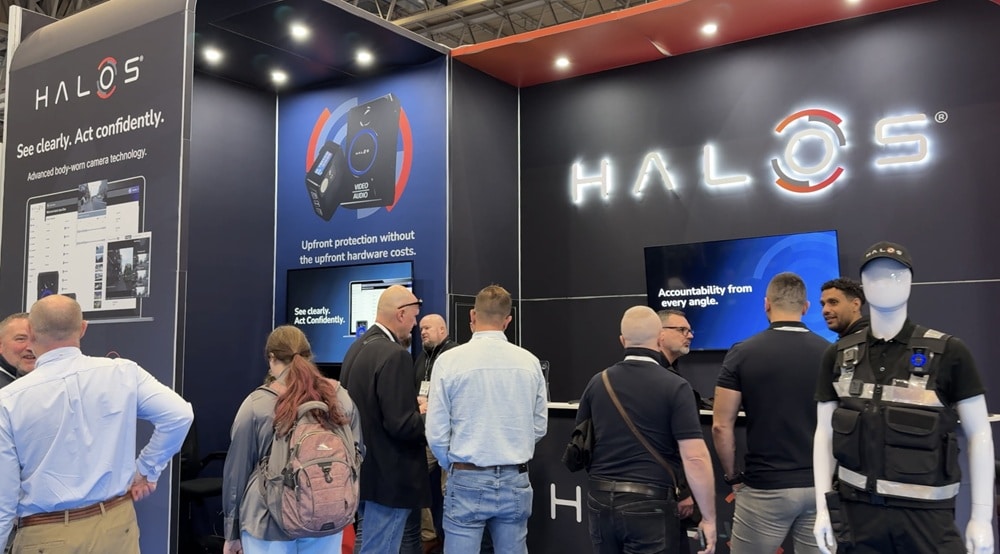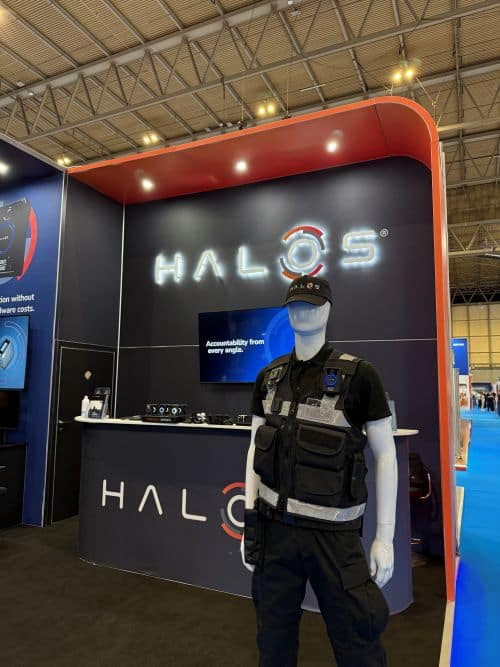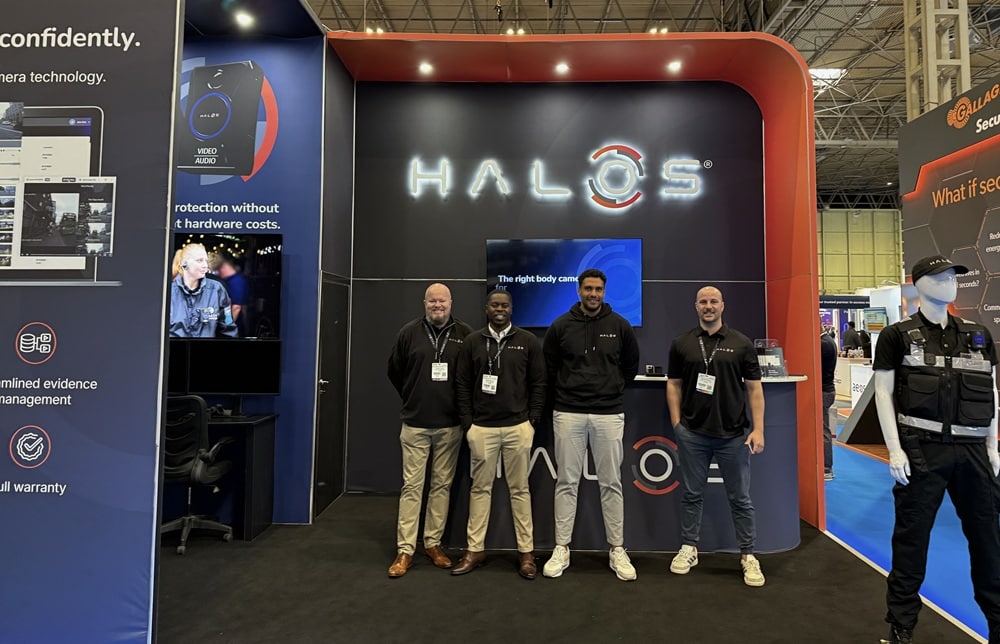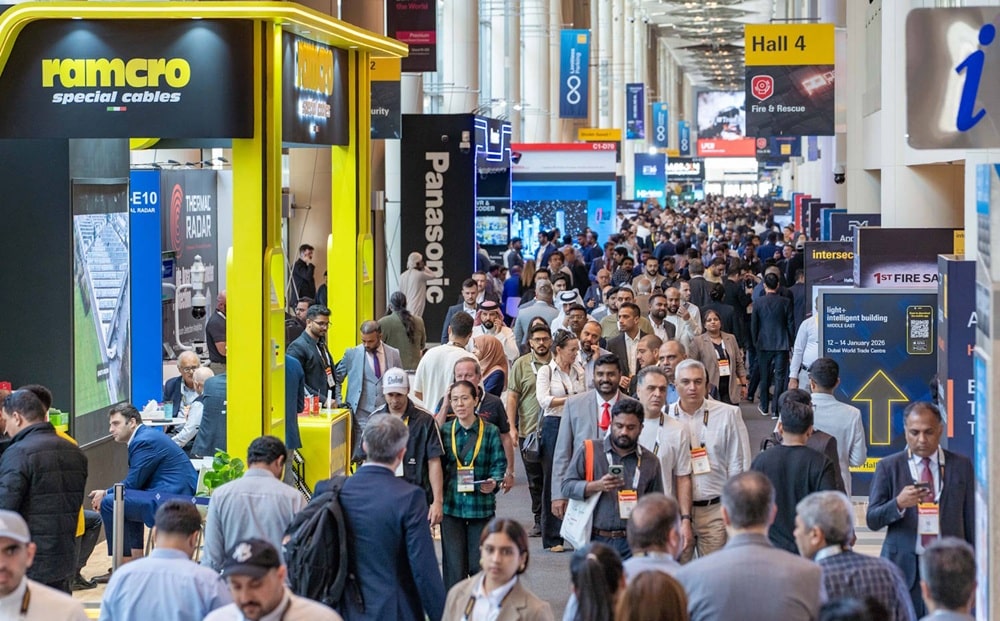HALOS Body Cameras is a company based in the U.S, Northern Ireland and the republic of Ireland which specialises in body-worn cameras for the private sector, across retail, transport, private security, and healthcare. The company was showcasing a number of its innovations at The Security Event this year, including the HALOS Horizon Body Camera – a trusted choice for high-stakes environments, such as private security and asset recovery. In this exclusive interview, Peter Mawson speaks to Head of Enterprise Solutions, Matt Dawes, about why the retail sector is becoming its biggest market, and explores what the future of body-worn technology might look like.
Peter Mawson: “What’s been the highlight of feedback you’ve had on the stand here?”
Matt Dawes: “TSE is always a good show to do. For us it’s really useful to catch up with existing customers, and to talk about their requirements. And, at a show like this, you get a whole host of different verticals, and one of the really interesting things that we find is that it gives us really good insight into the challenges faced by some of these market verticals. And that helps us in terms of the work we need to do on our product roadmap, and from a sales perspective.”
PM: “Bodycams have really come into their own over the last few years. Why should people be looking at you rather than other providers?”
MD: “I think it depends what you’re looking for. There are a number of good vendors out there, and each one specialises within its own market vertical, I’d say our specialism is really in bringing a product that fits the private sector, and is not so much just about public safety. We make products that businesses can use to protect their people.”
PM: “And could you give us an example case study?”
MD: “We work with a number of high street retailers, though we can’t specify names.”
PM: “So, you proved your position, or are proving your position in the industry?”
MD: “Well, if you look at the industry, and the history of the industry, clearly law enforcement was the first boom, then it was widely adopted by the security industry – private security, personal security, etc, and now the big boom is in the retail sector. And we’ve gone from seeing these being worn, not only on guards, to them being fairly ubiquitous on colleagues as well.”

PM: “Is a driver there being that retail has become less safe than it was?”
MD: “Absolutely, yeah. You only have to read the news articles and speak to people who work in retail. There’s been a clear upshift in acquisitive crime, and off the back of that comes the violence and aggression, and abuse. It’s something that retail workers shouldn’t have to face, but unfortunately, they do, and body-worn cameras provide a really good deterrent. Where that deterrent isn’t enough to prevent the attack, they offer the opportunity to capture evidence and support any prosecution.”
PM: “So, say you have these body-worn cams deployed in a supermarket, and there’s an incident, what’s the process?”

MD: “So, that bodycam is there as deterrent and evidence collection. If there is an incident, the footage would be uploaded to a software platform where somebody, whether that’s onsite or offsite, would review that footage, and then share it with law enforcement, and that footage will sometimes, if there’s a need to, be retained, to protect the business in further allegations that may come down the line.
“We’re seeing a shift now towards being able to support colleagues in the field remotely. So, a lot of these big retailers will have security operations centres, and alarm receiving centres, where they are now able to monitor the situation live and communicate directly with the person who is wearing the body-worn camera – we have the ability to livestream, and utilise panic alerts as well. So, somebody in the field, could effectively, hit the panic alert, hit the livestream, and that would be broadcast in the security centre.”
PM: “So, it could also be good for a lone worker?”
MD: “Absolutely, and again it’s a big space for lone workers, and people working out in the field. The beauty of our solution is that you could effectively have a communications device, a body-worn camera and a lone worker device all built into one. They’re GPS tracked as well.
“And because we only offer connected devices, they can be accessed anytime, anywhere. So, it’s a really exciting product.”
PM: “Talking generally, do you think we’ve reached the highest end of what a bodycam is now, or is there anything to come?”
MD: “The buzzword at the moment is AI, and everybody is saying they’ve got it in their products but what that AI actually does or the value it adds is sometimes questionable. But there is certainly a move towards things like audio transcription, the ability to see something and be able to analyse it in terms of threat detection, particularly if there’s an active shooter, in say, the USA.
“In the UK it’s really about search features embedded in the software and audio transcription are the big ones, the boring, practical things that makes the job easier.
“But I think that really, in terms of where the market is moving, body-worn cams are not a panacea. A body cam isn’t going to save a business; it’s not going to make the biggest impact. What we do really well is we realise that we are just one cog in the machine.
“So, if we take retail as an example – they will have a whole security ecosystem, and how we need to move forward is to say, “how does our data play into that?” A lot of large businesses now have crime intelligence platforms and are able to take all that data – CCTV, ANPR, body-worn video and turn that into intelligence. So, the question for us is how can we integrate into a platform that retailers want to use? That is where things are moving.”
PM: “Why should anyone looking for a product like this, come to you?”
MD: “If you’re looking for a specialist device for the private sector, and you’re looking to support your staff remotely, and you want to have a partner that really understands the challenges of that particular market, then come to us.
“A final thing I want to add, is that we offer a subscription service where all of the features are available to every single client.”
PM: “People know what they’re getting when they sign an agreement with HALOS? And they know they can budget accordingly and don’t get caught out.”
MD: “Absolutely, and they know that we warrant that product for the contractor as well. They know what they’re paying for. They know everything they’re going to get, and then we invest a lot on the customer service side so we will provide a customer success manager to those clients who will then give actual insights into the usage, and that’s a really important point. There’s a lot of investment in body-worn camera and a client will need to know, is that investment being realised? Who’s using the cameras? Are they being turned on everyday? And what we’re able to do is offer that insight and answer those questions.”
PM: “Sounds like there is real intelligent management behind the deployment as well.”
MD: “Absolutely, so we’re giving those insights back to the customers, so they can manage their estate, optimise engagement usage, and make sure they’re getting the best out of those products.”
For more TSE news, click here




